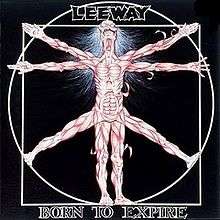Born to Expire
Born to Expire is the debut album from New York City band, Leeway.
| Born to Expire | ||||
|---|---|---|---|---|
 | ||||
| Studio album by | ||||
| Released | January, 1989 | |||
| Recorded | November, 1987 Normandy Sound, Warren, Rhode Island, USA | |||
| Genre | Crossover thrash, hardcore punk | |||
| Length | 37:44 | |||
| Label | Profile Records/Rock Hotel Another Planet (reissue) | |||
| Producer | Chris Williamson | |||
| Leeway chronology | ||||
| ||||
| Review scores | |
|---|---|
| Source | Rating |
| Allmusic | |
| Kerrang! | |
It was recorded in November, 1987. Delays postponed its release to January, 1989 – jointly on Rock Hotel and Profile Records. It was followed up by Desperate Measures in 1991. In 1996, Another Planet re-issued the album on the same CD as Desperate Measures.
The song “Enforcer” is featured on the LCHC radio station in the 2008 video game Grand Theft Auto IV.
Overview
Lyrically and vocally, Leeway were firmly rooted in the hardcore punk genre as could also be seen by the company they chose to keep – Corrosion of Conformity, Bad Brains, Circle Jerks, Sick Of It All, and Prong to name but a few. Musically, however, it was most definitely metal and a compromise label of thrash/crossover was achieved but still left a few questions unanswered. In truth, many fans of both genres had their likes and dislikes – even between songs.
Guitarist and songwriter, A.J. Novello, had this to say on the dichotomy caused by this album:
(the album) came out and surprised everyone because it was totally metallic sounding... (it) re-wrote the book on New York hardcore. Leeway just about killed{the} "hardcore"sound because we used heavy guitar sounds and spent time on actual tones and textures instead of throwing things together haphazardly." [3]
Most of the songs are played at thrash metal pace but at hardcore punk-style track lengths. The band even had time to experiment with rap and funk on "Catholic High School".
Guitarist Michael Gibbons spoke about the album's signature guitar sound:
You really can't beat a Marshall JCM800 for a guitar amplifier. It's just that simple and truthful. We experimented with lots of tones, re-positioning the cabinets, mic placements, etc. Having Tom Soares as the album's engineer, him knowing his studio so well, was also a huge help. In terms of the guitars, I used a Gibson Les Paul Custom with a Seymour Duncan custom pickup, and A.J. used his Gibson SG.[4]
Track listing
All tracks are written by Eddie Sutton and A.J. Novello, except where noted.
| No. | Title | Length |
|---|---|---|
| 1. | "Rise and Fall" (Sutton, Novello, Ackerman) | 3:54 |
| 2. | "Mark of the Squealer" | 3:40 |
| 3. | "Be Loud" | 2:18 |
| 4. | "On the Outside" | 3:25 |
| 5. | "Defy You" | 3:09 |
| 6. | "Enforcer" | 3:48 |
| 7. | "Tools for War" | 3:08 |
| 8. | "Born to Expire" | 4:07 |
| 9. | "Marathon" | 2:14 |
| 10. | "Self Defense" | 1:25 |
| 11. | "Catholic High School (Girls in Trouble)" | 2:01 |
| 12. | "Unexpected" | 4:35 |
Credits
- Eddie Sutton – vocals
- A.J. Novello – guitar
- Michael Gibbons – guitar
- Zowie – bass
- Tony Fontão – drums
- Recorded in November, 1987 at Normandy Sound, Warren, Rhode Island, USA
- Produced by Chris Williamson
- Engineered by Tom Soares
- Assistant engineered by Jamie Locke
- Cover art by Bevin Stone
- Mastered by Howie Weinberg at Masterdisk, New York City, USA
- Re-issue re-mastered by Alan Douches at West Westside Music
Notes
- Anderson, Alex. "Leeway Born to Expire review". Allmusic. Rovi Corporation. Retrieved 2011-10-18.
- Esposito, Ed (21 January 1989). "Leeway 'Born to Expire'". Kerrang!. 222. London, UK: Spotlight Publications ltd. p. 21.
- Eric Wielander's liner notes from the 1996 Another Planet re-issue of Born to Expire/Desperate Measures
- 2014 interview with Michael Gibbons on NoEcho.net.